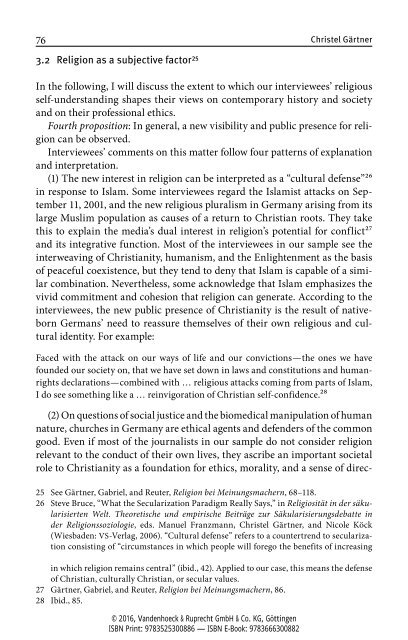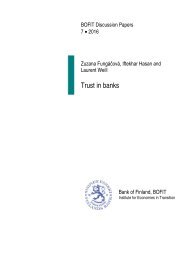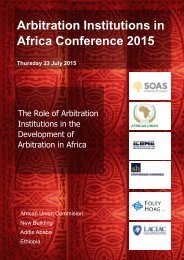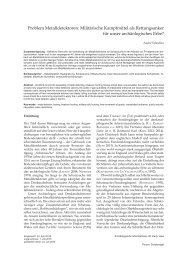Media and Minorities
9783666300882_ruhrmann_media_ebook_034247
9783666300882_ruhrmann_media_ebook_034247
You also want an ePaper? Increase the reach of your titles
YUMPU automatically turns print PDFs into web optimized ePapers that Google loves.
76<br />
Christel Gärtner<br />
3.2 Religion as a subjective factor25<br />
In the following, I will discuss the extent to which our interviewees’ religious<br />
self-underst<strong>and</strong>ing shapes their views on contemporary history <strong>and</strong> society<br />
<strong>and</strong> on their professional ethics.<br />
Fourth proposition: In general, a new visibility <strong>and</strong> public presence for religion<br />
can be observed.<br />
Interviewees’ comments on this matter follow four patterns of explanation<br />
<strong>and</strong> interpretation.<br />
(1) The new interest in religion can be interpreted as a “cultural defense”26<br />
in response to Islam. Some interviewees regard the Islamist attacks on September<br />
11, 2001, <strong>and</strong> the new religious pluralism in Germany arising from its<br />
large Muslim population as causes of a return to Christian roots. They take<br />
this to explain the media’s dual interest in religion’s potential for conflict27<br />
<strong>and</strong> its integrative function. Most of the interviewees in our sample see the<br />
interweaving of Christianity, humanism, <strong>and</strong> the Enlightenment as the basis<br />
of peaceful coexistence, but they tend to deny that Islam is capable of a similar<br />
combination. Nevertheless, some acknowledge that Islam emphasizes the<br />
vivid commitment <strong>and</strong> cohesion that religion can generate. According to the<br />
interviewees, the new public presence of Christianity is the result of nativeborn<br />
Germans’ need to reassure themselves of their own religious <strong>and</strong> cultural<br />
identity. For example:<br />
Faced with the attack on our ways of life <strong>and</strong> our convictions — the ones we have<br />
founded our society on, that we have set down in laws <strong>and</strong> constitutions <strong>and</strong> humanrights<br />
declarations — combined with … religious attacks coming from parts of Islam,<br />
I do see something like a … reinvigoration of Christian self-confidence.28<br />
(2) On questions of social justice <strong>and</strong> the biomedical manipulation of human<br />
nature, churches in Germany are ethical agents <strong>and</strong> defenders of the common<br />
good. Even if most of the journalists in our sample do not consider religion<br />
relevant to the conduct of their own lives, they ascribe an important societal<br />
role to Christianity as a foundation for ethics, morality, <strong>and</strong> a sense of direc-<br />
25 See Gärtner, Gabriel, <strong>and</strong> Reuter, Religion bei Meinungsmachern, 68–118.<br />
26 Steve Bruce, “What the Secularization Paradigm Really Says,” in Religiosität in der säkularisierten<br />
Welt. Theoretische und empirische Beiträge zur Säkularisierungsdebatte in<br />
der Religionssoziologie, eds. Manuel Franzmann, Christel Gärtner, <strong>and</strong> Nicole Köck<br />
(Wiesbaden: VS-Verlag, 2006). “Cultural defense” refers to a countertrend to secularization<br />
consisting of “circumstances in which people will forego the benefits of increasing<br />
in which religion remains central” (ibid., 42). Applied to our case, this means the defense<br />
of Christian, culturally Christian, or secular values.<br />
27 Gärtner, Gabriel, <strong>and</strong> Reuter, Religion bei Meinungsmachern, 86.<br />
28 Ibid., 85.<br />
© 2016, V<strong>and</strong>enhoeck & Ruprecht GmbH & Co. KG, Göttingen<br />
ISBN Print: 9783525300886 — ISBN E-Book: 9783666300882







